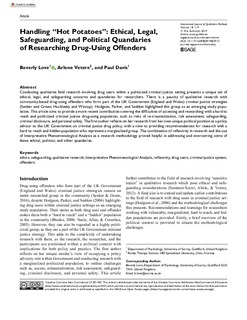Handling “Hot Potatoes”: ethical, legal, safeguarding, and political quandaries of researching drug-using offenders
Journal article, Peer reviewed
Published version
Permanent lenke
http://hdl.handle.net/11250/2607909Utgivelsesdato
2019Metadata
Vis full innførselSamlinger
- Artikler / Articles [1186]
- Publikasjoner fra CRIStin [1133]
Originalversjon
International Institute for Qualitative Methodology. 2019, 18, 1-9 10.1177/1609406919859713Sammendrag
Conducting qualitative field research involving drug users within a politicized criminal justice setting presents a unique set of ethical, legal, and safeguarding concerns and quandaries for researchers. There is a paucity of qualitative research with community-based drug-using offenders who form part of the UK Government (England and Wales) criminal justice strategies (Senker and Green; Hucklesby and Wincup). Hodgson, Parker, and Seddon highlighted this group as an emerging study population. This article aims to provide a more recent contribution covering the difficulties of accessing and researching with a hard to reach and politicized criminal justice drug-using population, such as risks of re-traumatization, risk assessment, safeguarding, criminal disclosure, and personal safety. The first author reflects on her research from her own unique political position as a policy advisor to the UK Government on criminal justice drug policy, with a view to providing recommendations for research with a hard to reach and hidden population who represent a marginalized group. The combination of reflexivity in research and the use of Interpretative Phenomenological Analysis as a research methodology proved helpful in addressing and overcoming some of these ethical, political, and other quandaries.
